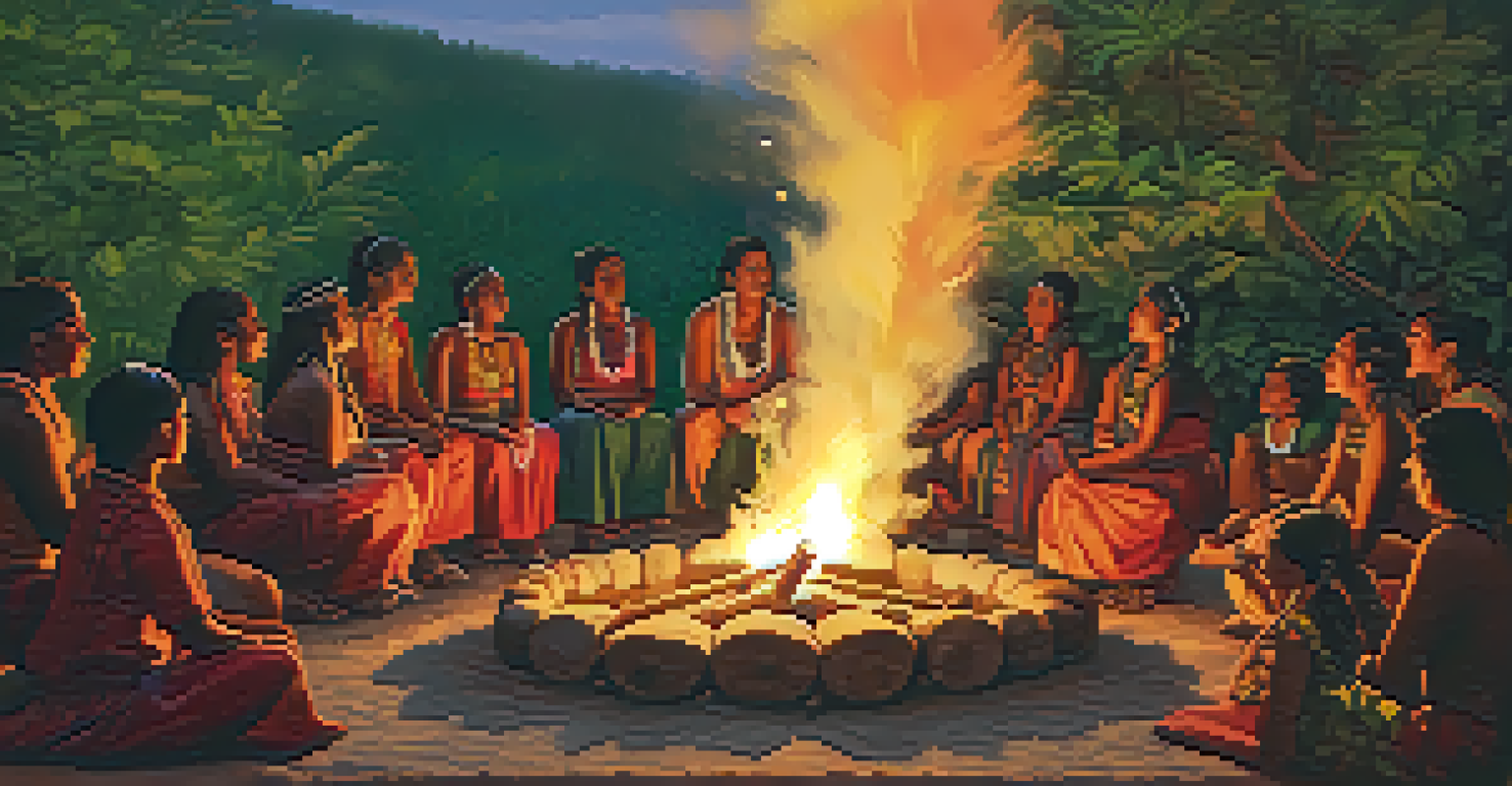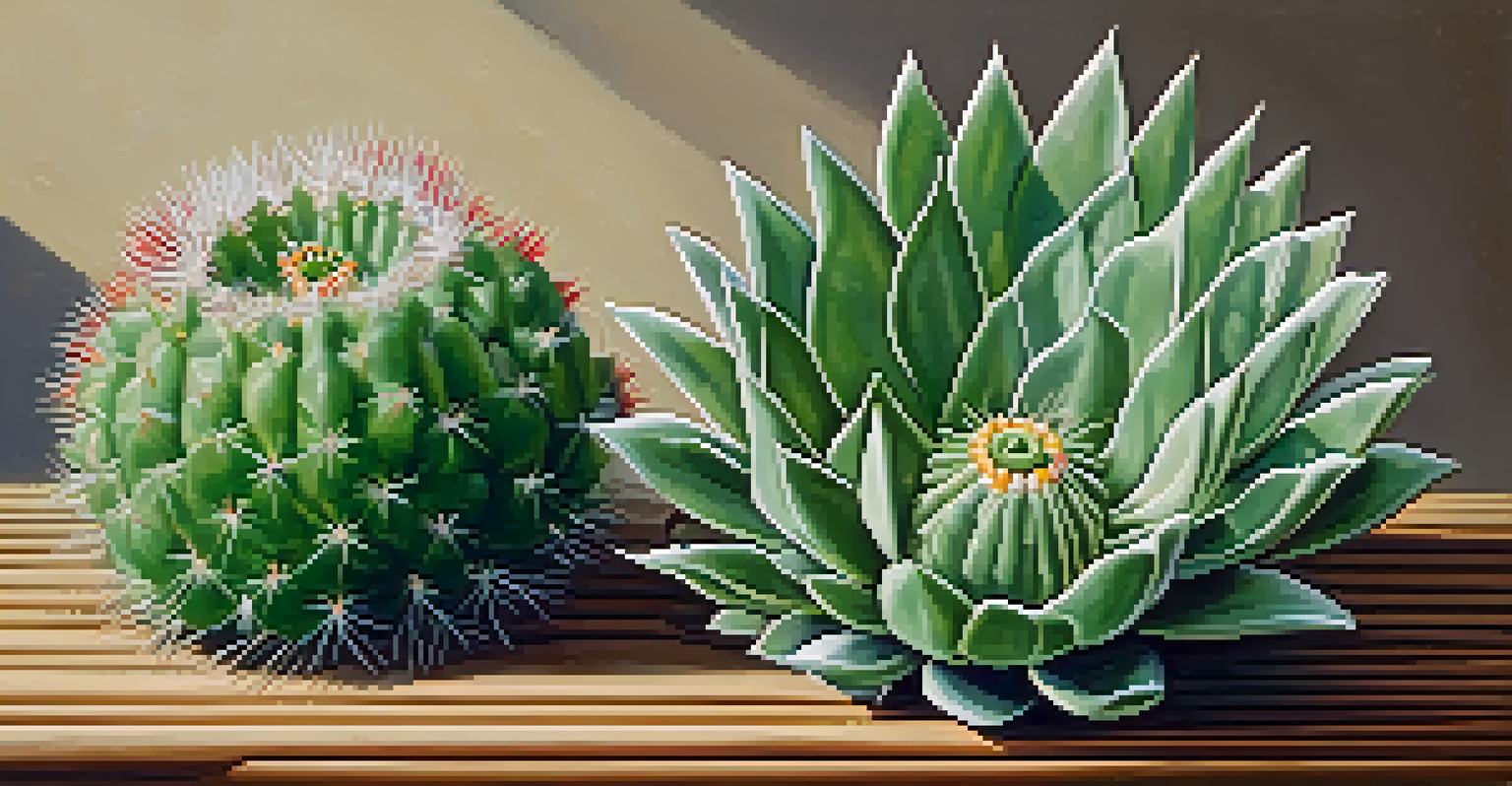Indigenous Legends and Myths Surrounding Peyote's Origins

The Sacred Nature of Peyote in Indigenous Cultures
Peyote, a small cactus native to Mexico and the southern United States, holds significant spiritual value in many Indigenous cultures. For centuries, it has been used not just as a psychoactive substance, but as a sacred tool for healing and connection with the divine. Its role in ceremonies reflects a deep respect for nature and the belief that plants possess wisdom.
The plant is seen as a gift from the Creator, meant to aid in healing both physical ailments and spiritual disconnection.
Various Indigenous tribes, including the Huichol and the Navajo, have their unique perspectives on peyote's origins. These stories often intertwine the cactus with creation myths, illustrating how peyote came to be a part of their spiritual practices. This highlights the importance of peyote beyond its physical properties, emphasizing its role in fostering community and cultural identity.
The reverence for peyote can be seen in rituals that have been passed down through generations. These ceremonies not only honor the plant itself but also the ancestors and spirits that guide practitioners. As such, peyote is more than just a psychoactive agent; it's a bridge to the spiritual realm.
Huichol Legends of Peyote's Creation
In Huichol culture, one of the most powerful legends involves the journey of the sun and the moon, resulting in the creation of peyote. According to this myth, the sun decided to share its energy with the earth, leading to the emergence of the peyote cactus. This story illustrates the interconnectedness of celestial and earthly realms, where each entity plays a vital role in the cycle of life.

The Huichol people believe that the spirit of the peyote cactus contains the essence of their ancestors, providing guidance and wisdom during ceremonies. When consumed, peyote is said to foster communication with these spirits, allowing participants to gain insights into their lives and the universe. This connection reinforces the cultural significance of peyote within their spiritual practices.
Peyote's Sacred Role in Healing
Peyote serves as a sacred tool in Indigenous cultures, facilitating healing and spiritual connection through communal rituals.
Thus, the Huichol legends not only explain the origins of peyote but also emphasize the responsibility that comes with its use. Those who partake in peyote ceremonies are expected to approach the experience with respect and intention, recognizing the sacredness of the journey they are embarking on.
Navajo Perspectives on Peyote's Origins
The Navajo people have their own unique narratives surrounding peyote. One popular story tells of a divine figure who descended to teach the Navajo about the medicinal properties of plants, including peyote. This legend highlights the belief that nature is a source of knowledge and healing, a theme prevalent in many Indigenous cultures.
Indigenous legends often include themes of balance and respect for the earth, serving as reminders of our responsibility to protect natural resources.
In Navajo tradition, peyote is often associated with the restoration of balance and harmony. The plant is seen as a gift from the Creator, meant to aid in healing both physical ailments and spiritual disconnection. This belief reveals a deep understanding of the holistic nature of health, which integrates body, mind, and spirit.
Furthermore, the Navajo emphasize the importance of community in their peyote rituals. These gatherings serve not only as opportunities for individual healing but also as a means to strengthen familial and communal bonds. This collective approach underscores the significance of shared experiences in Indigenous spirituality.
The Role of Peyote in Ceremonial Practices
Across various Indigenous cultures, peyote plays a central role in ceremonial practices aimed at healing and spiritual growth. These ceremonies often involve storytelling, singing, and communal sharing, creating a sacred space for participants to connect with one another and the divine. Such practices highlight the social aspect of spirituality, where collective experiences enhance individual understanding.
During these rituals, peyote is consumed in a respectful manner, often accompanied by prayers and offerings. This approach demonstrates an acknowledgment of the plant's power and the importance of setting intentions before embarking on a transformative journey. The process reflects a deep reverence for the natural world and its gifts.
Indigenous Legends Shape Practices
Stories from cultures like the Huichol and Navajo highlight peyote's origins and emphasize the responsibility in its ceremonial use.
Ultimately, the ceremonies surrounding peyote serve as a reminder of the interconnectedness of all living beings. They create a space for healing, reflection, and deeper understanding of one’s place within the cosmos, fostering a sense of belonging and purpose.
Modern Interpretations of Indigenous Peyote Myths
In contemporary society, Indigenous legends about peyote's origins continue to inspire and inform various spiritual practices. Many non-Indigenous individuals are drawn to the plant for its psychoactive effects, often seeking a deeper connection to nature and spirituality. However, it's crucial to approach these practices with respect for their origins and the cultures that have traditionally used peyote.
Modern interpretations can sometimes dilute the sacredness of these rituals, leading to a commodification of peyote. This raises important questions about cultural appropriation and the ethical implications of using Indigenous spiritual practices without understanding their significance. Engaging with these myths requires a commitment to learning and honoring the traditions from which they stem.
As awareness grows surrounding the importance of Indigenous rights and cultural preservation, there is hope for a respectful dialogue about peyote and its role in both traditional and modern contexts. By acknowledging the stories and beliefs of Indigenous peoples, we can foster a deeper appreciation for the wisdom they offer.
Peyote and Environmental Stewardship
The cultivation and use of peyote also bring to light important conversations about environmental stewardship. Many Indigenous cultures emphasize a reciprocal relationship with nature, advocating for sustainable practices that honor the land and its resources. This perspective is particularly relevant as peyote faces threats from overharvesting and habitat loss.
Indigenous legends often include themes of balance and respect for the earth, serving as reminders of our responsibility to protect natural resources. By understanding the origins of peyote and its cultural significance, we can advocate for practices that promote sustainability and conservation. Supporting Indigenous-led initiatives can help ensure the survival of both peyote and the traditions associated with it.
Environmental Stewardship and Peyote
The cultivation of peyote stresses the importance of sustainable practices, reflecting Indigenous values of balance and respect for nature.
In this way, the stories surrounding peyote not only highlight its spiritual importance but also underscore the necessity of caring for the environment. As we move forward, embracing these teachings can inspire us to adopt more sustainable lifestyles that reflect an understanding of our interconnectedness with the earth.
The Future of Peyote in Indigenous Cultures
As we look to the future, the role of peyote within Indigenous cultures remains dynamic and ever-evolving. While traditional practices continue to be upheld, modern challenges such as climate change, cultural appropriation, and legal restrictions present obstacles. Indigenous communities are actively working to reclaim their narratives and ensure that their spiritual practices are respected and preserved.
The resurgence of interest in Indigenous wisdom and practices has led to a renewed appreciation for peyote and its significance. This growing awareness can foster greater respect for Indigenous cultures and their contributions to ecological and spiritual understanding. Encouraging dialogue and partnerships can help bridge gaps between Indigenous and non-Indigenous communities.

Ultimately, the future of peyote lies in the hands of those who honor its traditions and teachings. By fostering a respectful relationship with Indigenous cultures, we can help ensure that the rich myths and legends surrounding peyote continue to thrive for generations to come.